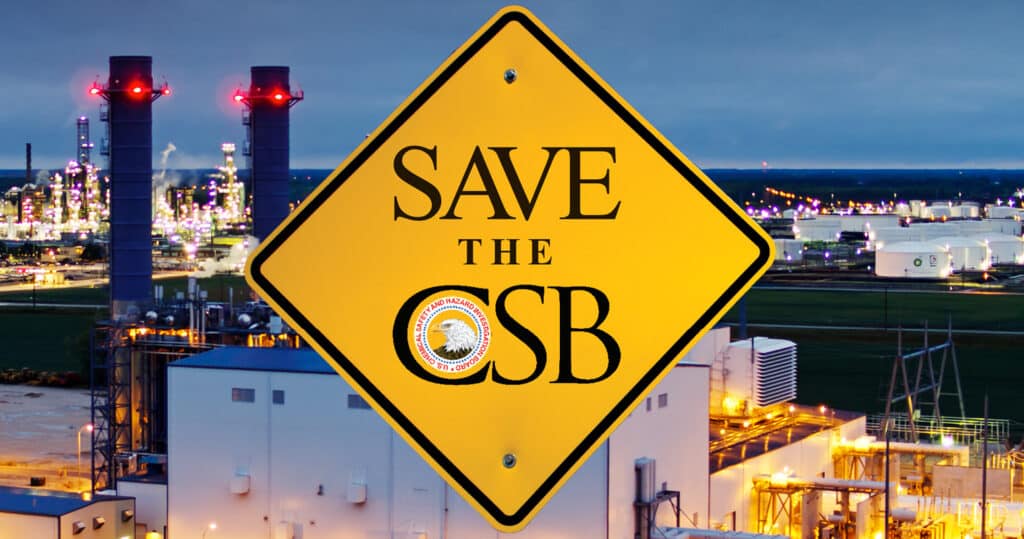Safety Agencies in Danger
Scheme to Gut Federal Watchdogs Puts Workers at Risk
When an explosion at the BP-Husky refinery in Oregon, Ohio, took the lives of Max and Ben Morrissey – siblings by blood and USW membership – in September 2022, workers knew that a full investigation of the tragedy was the best way to honor them while making their workplace safer.

Members of Local 1-346 looked to the one federal agency with the skill and tenacity to do so – the U.S. Chemical Safety and Hazard Investigation Board, known as the CSB.
The CSB investigates chemical-related incidents, issues detailed reports on what went wrong, and recommends steps to prevent future disasters. Since its inception in 1998, the agency has investigated nearly 180 incidents that included more than 200 fatalities and billions of dollars in damage to workplaces and communities.
Throughout its history, the CSB has issued more than 1,000 recommendations aimed at keeping American workers safer. The agency’s budget last year was $14.4 million, and it employs a staff of just 50 people, meaning that eliminating it would save the government a minuscule fraction of its more than $7 trillion budget, while putting Americans at greater risk.
“You know that they just want to find the answers,” said Kyle Downour, unit chair for Local 1-346 at the Oregon refinery. He worked closely with investigators and said USW members were able to raise questions and had input into every phase of the investigation. “You don’t want anybody else to ever go through this.”

Eliminating Protections
Despite an outcry from unions, including the USW, industry groups, safety groups, lawmakers and environmental organizations, the Trump administration wants to abolish the CSB by 2026, a goal it failed to accomplish in its first term.
The scheme is part of a broader campaign to gut agencies that are essential to keeping workers safe, including the Occupational Safety and Health Administration (OSHA), the National Institute for Occupational Safety and Health (NIOSH), and the Mine Safety and Health Administration (MSHA).
While all four agencies have separate roles, together they compose an essential safety net for workers.
“The administration’s baseless assault on federal safety agencies puts workers and communities in peril,” said International President David McCall.
In May, a coalition of unions, nonprofit organizations and industry groups sued the administration over what the group called an “unlawful shutdown” of NIOSH operations.
“Working people have fought too hard for these critical protections” to watch them disappear with the stroke of a pen, said AFL-CIO President Liz Shuler.
More than 5,000 U.S. workers die on the job each year, while an estimated 135,000 succumb to occupational diseases.

Calls for Change
Following the tragedy at the Ohio refinery, the CSB recommended sweeping improvements to refinery operations. It also called for industrywide safety enhancements and urged two trade organizations, the American Petroleum Institute and the International Society of Automation, to help drive safer practices among their members.
Similarly, following a massive explosion in 2019 at the Philadelphia Energy Solutions refinery, the agency called for improved safeguards and updated technology to protect workers and surrounding communities from disaster.
Life-saving findings like that “last forever,” helping more workers every day, said Local 248 President Bob Garrou, who works at a Packaging Corp. of America (PCA) facility in Tomahawk, Wis.
In 2008, three of Garrou’s co-workers died and a fourth sustained injuries when a tank containing recycled water and fiber waste exploded during welding repairs.
‘It Opened Our Eyes’
After an investigation, CSB warned paper companies and workers nationwide about the flammable nature of decomposing pulp, a previously unrecognized hazard.
“You don’t think about rotting wood being explosive, but it is,” said Garrou, who ensures that all newly hired workers at PCA understand the danger and believes that their counterparts at other facilities are safer today because of the CSB’s work.
“The CSB really opened our eyes,” he said. “The CSB educated me and gave me really good tools for educating my members.”
For Garrou, the push to eliminate safety agencies like the CSB isn’t about trimming the budget, but instead about the Trump administration’s desire to help corporations cut corners wherever they can.
“They pay for themselves every day,” Garrou said of the CSB’s experts. “I can’t believe they’re on the chopping block.”
By clicking Sign Up you're confirming that you agree with our Terms and Conditions.
Recent News Articles
Want to Learn More?
See how the USW is making a real difference in our communities and our workplaces.